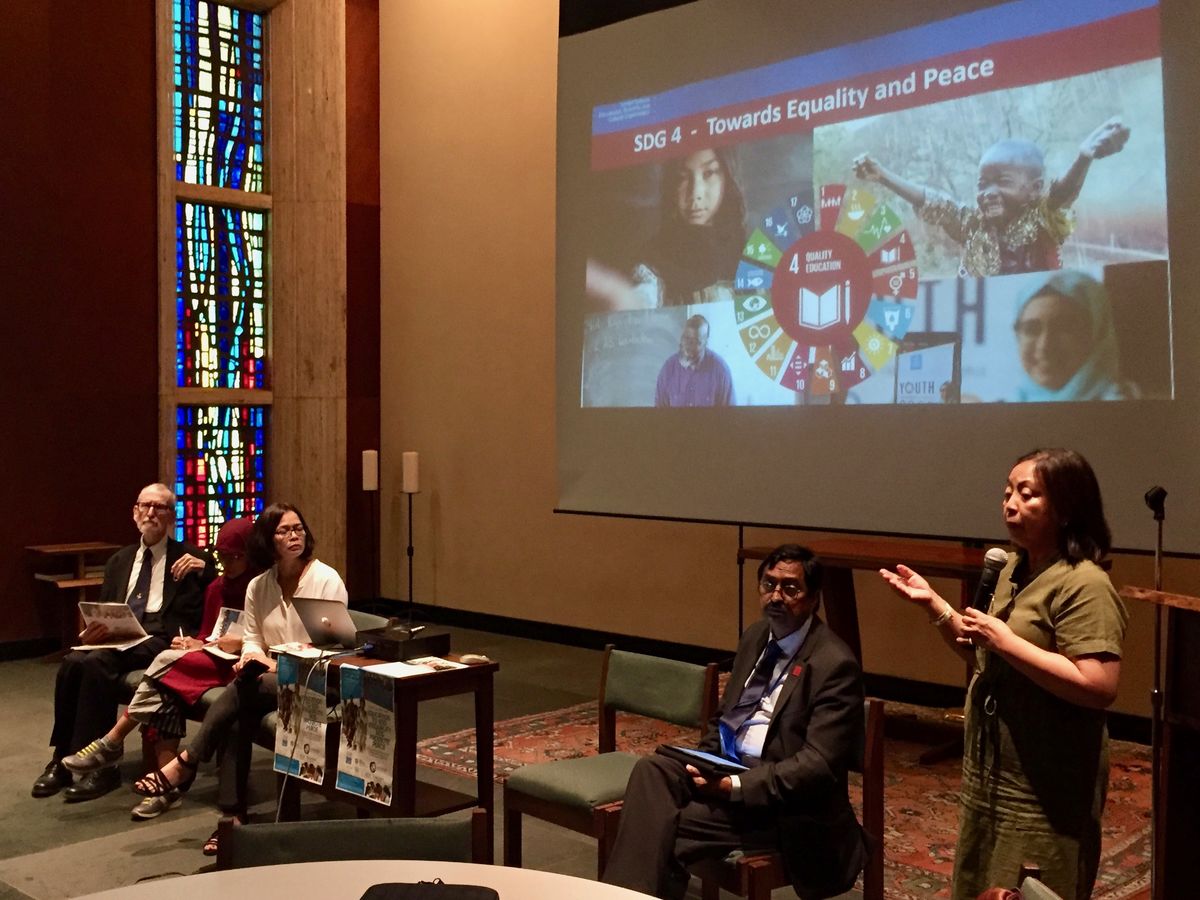Church and Society at UN's High-level Political Forum: “Education to End Inequality and Promote Peace”
Church and Society recently co-sponsored a high-level program on the United Nations' goal of quality education for all. The goal is one of the 17 Sustainable Development Goals currently being pursued by the UN.

For two weeks every July, the United Nations holds its High-level Political Forum.
For member states, it’s a time to report on progress toward meeting the 17 Sustainable Development Goals and share ideas about what’s working and what’s not.
These 17 collective goals comprise a major part of the 2030 Agenda for Sustainable Development, the goals the U.N. aspires to achieve by 2030. The goals affect literally everyone, but United Methodists are often quick to notice the deep parallels between the 17 goals and our mandate outlined in the Social Principles.
For civil society organizations like Church and Society, it’s a chance to engage with member states and lend our unique perspectives. Church and Society has contributed its voice to the High-level Political Forum since the forum’s inception, and this year we joined forces with the Asia South Pacific Association for Basic and Adult Education to co-sponsor their annual event focusing on Sustainable Development Goal No. 4, quality education for all.
The Asia Development Alliance, Episcopal Church, Soka Gakkai International, the Conference of Non-Governmental Organizations in consultative relationship with the U.N., and Global Call to Action Against Poverty also contributed valuable resources, demonstrating the powerful cooperative efforts we must make to accomplish these 17 goals.
Though definitions of “quality education” can certainly be debated, there’s widespread agreement with the NGO Major Group’s statement on this goal: “High-quality learning for all is a right acknowledged in international law and essential to breaking the poverty cycle, supporting environmental sustainability, and bringing about well-being for individuals, nations and our world.”
With that in mind, the event on July 10 brought a high-level program of experts together to explore “Education to End Inequality and Promote Peace.”
Cyril Ritchie, first vice president of the Conference of Non-Governmental Organizations, spoke on behalf of the organization and its president, the Rev. Liberato Bautista, who also serves as assistant general secretary for international affairs and United Nations ministry at Church and Society.
Ritchie explained why collective, multilateral action for education equality is critical if we’re to achieve a culture of peace. “Globally, there are still 750 million illiterate people who have been denied access to education, two-thirds of whom are women,” he said. “Hundreds of millions of children, youth and adults continue to be excluded and left behind. Twenty percent of the global population are deprived of good health, adequate education and decent housing. To achieve the world we want — the world we need — we must support each other in advancing all fronts of the [Sustainable Development Goals] simultaneously, focusing on implementation – internationally, nationally and locally.”
Beckie Malay, co-chair of Global Call to Action Against Poverty, offered context for addressing the global “learning crisis,” a term that denotes not only the disparities in accessibility to education, but the problem of students not learning much even when they are in school. For example, 58% of children and adolescents worldwide are not attaining minimum proficiency levels in reading and math. Part of Global Call to Action Against Poverty’s work includes finding out why, and filling in data gaps by studying the conditions of people living in inequality.
"Most people are aware of economic inequality – the 99% versus the 1% and the extreme income gap we see affecting people,” Malay said. “But inequality stems from all kinds of discrimination, based on gender, gender identity, sexual orientation, caste systems, the type of work people do or the descendants they come from. We want to make visible the faces of inequality and put education front and center as a solution.”
The world is not on track to meet its education commitments by 2030.
Jordan Naidoo, director of the Global Agenda 2030 Coordination TeamLastly, the United Nations Educational, Scientific and Cultural Organization’s Jordan Naidoo, director of the Global Agenda 2030 Coordination Team, provided key observations from his work monitoring the progress of Sustainable Development Goal No. 4. UNESCO uses index scoring to rank each member state — the results are clear and alarming. “The world is not on track to meet its education commitments by 2030,” Naidoo reported, reiterating the immediate need to stimulate a sense of urgency around the learning crisis and calling on every government to invest more. He emphasized that conflict creates exclusion to education – the best ranked countries are stable, and the worst ranked face the worst inequality, especially in terms of poverty.
He also noted that households in low-income countries bear the largest financial burden, with approximately 30% of their resources going toward education-related expenses. That’s why, he explained, leaving nobody behind is key. “We cannot achieve Agenda 2030 without [Sustainable Development Goal] 4. It’s paramount to prosperity and peace for all, and for protecting our planet. Education is a key driver for sustainable development,” he said. “Everyone has a stake in this.”